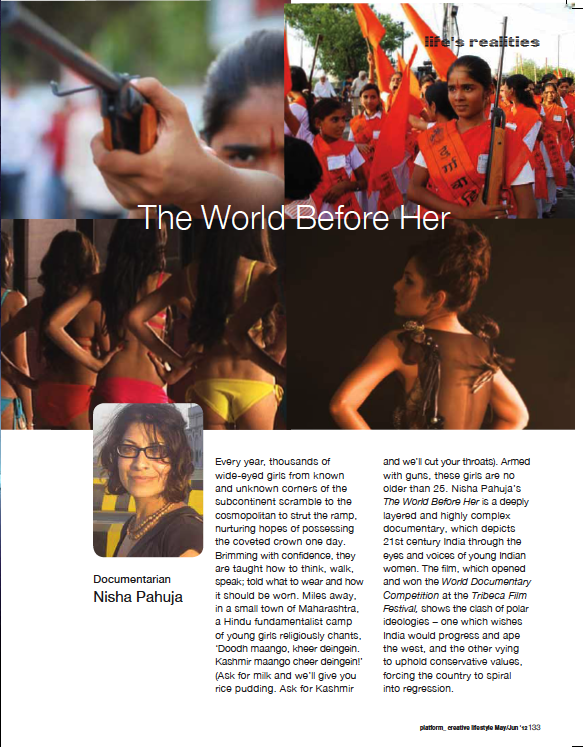A beauty parlour in Pakistan employs acid attack survivors
This story was published in Platform Magazine. Read in PDF here.
In 2003, Masarrat Misbah was attending to a client in her beauty salon in an affluent part of Lahore, Pakistan when a woman, hiding behind her veil, stumbled in. There was a certain degree of pronounced nervousness in her body language. She asked whether she could speak to Masarrat in private, and Masarrat led discreetly into another room. "When she lifted her veil, I had to sit down," she recounts. ‘In front of me was a woman with no face."
The bridge of the woman’s nose had collapsed, one of her eyes had sunken in and her chin merged indistinguishably into the folds of her neck. "I could not believe what I was looking at," Masarrat recalls. "Acid had been thrown all over [the woman’s] face and body." The woman had one plea: to be made beautiful again. "When I got a grip of myself, I told her that no beauty products could do any good. She would need a surgeon to help her. I asked her to come in the next day."
The woman however, refused to budge. Shunned by her own family and thrown onto the streets, she had trekked from another city to seek refuge in Masarrat’s salon. Masarrat opened her doors, arranged for an extra bed and the next day, began calling doctors and friends for help. That was the beginning of the Depilex Smileagain Foundation. Since 2003, over six-hundred acid attack survivors (who’ve been turned away from their homes) have found a new life at the Smileagain Foundation. Masarrat has been welcoming the survivors and helping them regain their footing in the world. The women receive reconstructive surgery, psychiatric support and are trained to fend for themselves. At the salon, they earn a livelihood by working as beauticians.
Bushra Shafi has been working as a hairstylist and a masseuse at Masarrat’s salon for a few years. She came across the Smileagain Foundation when she saw their advertisement in the newspaper. "I remember calling them immediately…I was married to a very greedy man," Bushra writes on email. ‘"My in-laws physically tortured me because I didn’t bring enough dowry after my wedding. One day they asked me to bring money from my parents, but I refused. That day they tied me up and threw acid on my face. My mother-in-law and my husband held me, pulled my tongue out and poured acid on it. They wanted to make everyone believe that I was suicidal, so they hanged me from the ceiling fan and set my room on fire. My neighbours saw the flames and rushed me to hospital." When Bushra joined the Smileagain family, she was greeted by over 40 survivors who were willing to share her suffering and lay her inhibitions to rest. "It gave me comfort in realizing that I wasn’t alone."
Bushra giving a pedicure. Image courtesy: Smileagain Foundation
Whether on busy streets or behind bolted doors, acid attacks have become an everyday episode in countries like India and Pakistan. In India, acid is readily available in local stores where a 750 ml of acid bottle can be purchased for a small sum of thirty rupees. ‘Dishonored’ families, jilted lovers, inadequate dowries, lack of a male heir, inability to adhere to an appropriate dress code—are a few reasons that women are subjected to violence.
In 2014, there were 160 acid attack cases that were reported in Pakistan. There is however, an astounding discrepancy between the cases registered and the actual number of incidents that occurred in the country. Human Rights organizations claim that most of the complaints go unregistered because the victims are afraid to speak up, fearing a subsequent assault. The silence, however, reverberates through the country and is almost deafening.
Beauty and confidence form the currencies of the world. To be stripped of these then, to be denied a voice, to be robbed of an identity, is the most debilitating form of existence. The consequence is earth shattering. While some drift to the peripheries with their stories silently brushed aside into the darkness, the coterie at Smileagain Foundation is like a relentless tide slowly gaining momentum. Rather than relying on men for their financial means, they have transformed into confident, independent women who are working effortlessly to make their own living.
There is an irony however, in acknowledging that though physically disfigured, the survivors work day and night assisting other women to look beautiful. Has this ever psychologically affected the survivors? "They are human too," says Masarrat. "I’ve seen it in their eyes—the urge to look beautiful when they are dressing the brides, but the supporting staff makes sure that the survivors feel positive about themselves. Our survivors are beautiful from the inside and are lucky to make someone look so beautiful."
Masarrat Misbah with Smileagain Foundation women
Refusing to retreat, the survivors consider their disfiguration to be a crutch, not an impediment. Their vigor and ardent will to survive stand as indisputable testimonies to that. Take the example of Sabra who met Masarrat in 2003. It was a minor domestic feud that prompted Sabra’s husband to pick up a bottle of kerosene and set her ablaze. Within a few moments, Sabra’s entire world had collapsed. Two months pregnant at the time, she lost her child and spent months recovering in the hospital. "Sabra came to me as a victim over 10 years ago," says Masarrat. "Since 2003 she has undergone more than 35 surgeries and has never given up. At Smileagain, she works as our patient coordinator. She accompanies the survivors from the time they arrive at the hospital to the time they are operated. She also stays with them till they leave the hospital. Back home, Sabra has an ailing mother of whom she takes care. She is the bravest individual I know. She is my hero!"
For Sabra and the other six-hundred odd survivors however, Masarrat is their hero, their anchor. "It is a mammoth responsibility," Masarrat accepts, slightly overwhelmed by the task. "But since I’m chosen to do this, I am doing it to the best of my means and abilities." Of course, she has encountered dissent; of course she has been threatened by families who are involved in the cases—they try to bully her into stepping back so that she cannot help the survivors scrounge for attorneys. But Masarrat is relentless in her mission; there is an irrepressible need to weed out the insidious culture of acid attacks once and for all. "When I look back now, I know that my only regret in life is that I didn’t start this earlier," she says. "It was happening long before I started my career as a beautician. I hope God gives me enough life and strength so that this abuse and crime can be eradicated. Only then will I sleep peacefully."







